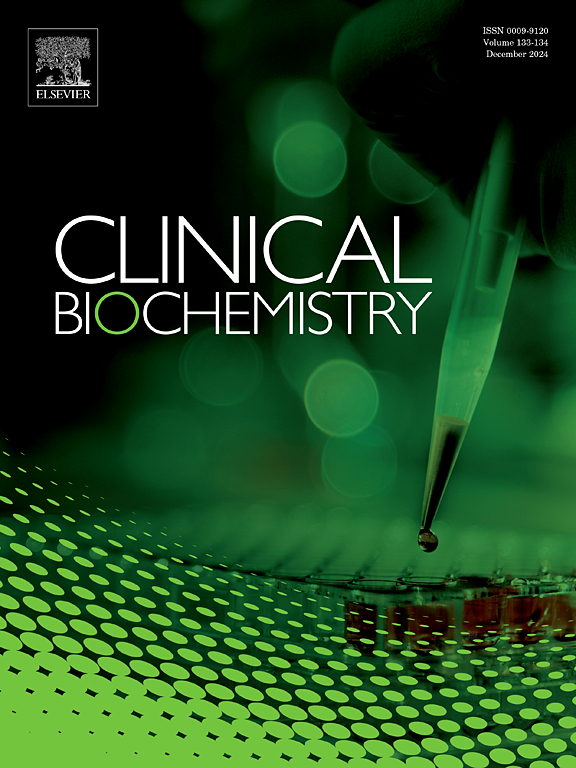KNG1 mutations (c.618 T > G and c.1165C > T) cause disruption of the Cys206-Cys218 disulfide bond and truncation of the D5 domain leading to hereditary high molecular weight kininogen deficiency
IF 2.1
3区 医学
Q2 MEDICAL LABORATORY TECHNOLOGY
引用次数: 0
Abstract
Background
High molecular weight kininogen (HMWK), encoded by the kininogen-1 (KNG1) gene, is a multifunctional glycoprotein closely associated with the initiation of blood coagulation, tumor growth, and other pathological processes.
Objective
We conducted a study on the clinical phenotype, genetic mutations, and molecular pathogenesis of a female patient with uterine leiomyosarcoma, who presented with HMWK deficiency and an isolated prolonged activated partial thromboplastin time (APTT).
Methods
Clinical phenotyping was conducted through APTT mixing studies, quantitative assessments of intrinsic coagulation factor activities, antigen levels of HMWK, and thromboelastography. Genetic analysis revealed a novel mutation within the KNG1 gene. Subsequent bioinformatics analysis focused on the evolutionary conservation of regions flanking codons 618 and 1165 of the KNG1 gene, with an aim of predicting the mutation’s functional impact.
Results
Clinical phenotypic analysis indicated a severe deficiency of HMWK antigen levels in the patient, with levels below 1.0 % of normal. Genetic sequencing identified two mutation sites in the KNG1 gene: a novel missense mutation in exon 5, c.618 T > G (p.Cys206Trp), which leads to disruption of the disulfide bond between Cys206 and Cys218, and a known nonsense mutation in exon 10, c.1165C > T (p.Arg389X), resulting in truncation of the D5 domain in the HMWK protein and reducing its quantity. These two mutations collectively impact the activation of HMWK within the coagulation system.
Conclusion
The compound heterozygous mutations, c.618 T > G (p.Cys206Trp) and c.1165C > T (p.Arg389X), result in a loss of HMWK function, leading to a deficiency in the kinin system and consequently a significant prolongation of the APTT. These findings advance understanding of coagulation factor deficiencies and inform diagnostic and therapeutic approaches for HMWK deficiency, potentially enhancing clinical management strategies.
KNG1突变(c.618 T > G和c.1165C > T)导致Cys206-Cys218二硫键断裂和D5结构域截断,导致遗传性高分子量激肽原缺乏。
背景:由kininogen-1 (KNG1)基因编码的高分子量激肽原(High molecular weight kininogen, HMWK)是一种与血液凝固、肿瘤生长和其他病理过程密切相关的多功能糖蛋白。目的:我们对一例女性子宫平滑肌肉瘤患者的临床表型、基因突变和分子发病机制进行了研究,该患者表现为HMWK缺乏和分离的活化部分凝血活素时间(APTT)延长。方法:通过APTT混合研究、内在凝血因子活性定量评估、HMWK抗原水平和血栓弹性成像进行临床表型分析。遗传分析显示KNG1基因中有一个新的突变。随后的生物信息学分析侧重于KNG1基因618和1165密码子两侧区域的进化保守性,目的是预测突变的功能影响。结果:临床表型分析显示患者HMWK抗原水平严重不足,低于正常值的1.0 %。基因测序鉴定出KNG1基因的两个突变位点:外显子5的一个新的错义突变,c.618 T > G (p.Cys206Trp),导致Cys206和Cys218之间的二硫键断裂;外显子10的一个已知的无义突变,c.1165C > T (p.g arg389x),导致HMWK蛋白的D5结构域截断并减少其数量。这两种突变共同影响凝血系统中HMWK的激活。结论:复合杂合突变c.618 T > G (p.Cys206Trp)和c.1165C > T (p.Arg389X)导致HMWK功能丧失,导致激肽系统缺陷,从而导致APTT显著延长。这些发现促进了对凝血因子缺乏症的理解,并为HMWK缺乏症的诊断和治疗方法提供了信息,潜在地增强了临床管理策略。
本文章由计算机程序翻译,如有差异,请以英文原文为准。
求助全文
约1分钟内获得全文
求助全文
来源期刊

Clinical biochemistry
医学-医学实验技术
CiteScore
5.10
自引率
0.00%
发文量
151
审稿时长
25 days
期刊介绍:
Clinical Biochemistry publishes articles relating to clinical chemistry, molecular biology and genetics, therapeutic drug monitoring and toxicology, laboratory immunology and laboratory medicine in general, with the focus on analytical and clinical investigation of laboratory tests in humans used for diagnosis, prognosis, treatment and therapy, and monitoring of disease.
 求助内容:
求助内容: 应助结果提醒方式:
应助结果提醒方式:


